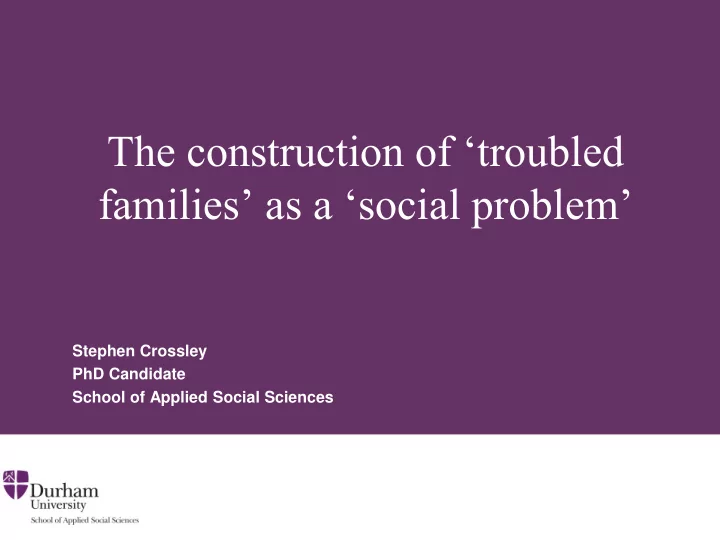

The construction of ‘troubled families’ as a ‘social problem’ Stephen Crossley PhD Candidate School of Applied Social Sciences
The long history…. • 1880s Victorian residuum • 1910s The unemployables • 1930s Social Problem Group ∂ • 1940s The ‘problem family’ • 1960s Culture of poverty • 1970s Cycle of deprivation • 1980s Underclass • 1990s Socially excluded Welshman (2013)
The more recent history…. Families with multiple disadvantages (5 out of 7) … • Maternal mental health • Low income ∂ • Unable to afford some food or clothing items • No parent in the family in work • Poor quality or overcrowded housing • No parent has any qualifications • At least one parent with long standing limiting illness or disability
The more recent history…. … become ‘troubled families’ • Crime / ASB • Truancy / non-attendance / exclusion from ∂ school • Worklessness • Plus ‘local filter criteria’ decided by individual local authorities which represents a ‘high cost’ to the public purse
Discursive shifts and factoids…. “if we interrogate the research behind the imputed existence of 120,000 troubled families, this turns out to be a factoid – something that ∂ takes the form of a fact, but is not … In the term ‘troubled families’ (the government) deliberately conflates families experiencing multiple disadvantage and families that cause trouble .” Levitas (2012: 4/12)
‘Troubled Families Programme ’ “Officialdom might call them ‘families with multiple disadvantages ’. Some in the press might call them ‘neighbours from hell’. Whatever you ∂ call them, we’ve known for years that a relatively small number of families are the source of a large proportion of the problems in society … We’ve always known that these families cost an extraordinary amount of money.” Cameron (2011)
Local authorities • All 152 local authorities in England involved in delivering the programme • Receive upfront attachment fees, with the ∂ remainder operating on Payment By Results • Must appoint a Troubled Families Co-ordinator • Must deliver programme based on ‘Family Intervention’ Model
Family Intervention Projects “ Looking at the family ‘from inside out rather than outside in” ∂ • “One worker. One family. One plan” • Whole family approach • Challenging, assertive approach • “Show, not tell” • “Practical, hands on support”
‘Family’ Workers • Social workers accused of ‘colluding’ with families • “What’s missing is love” ∂ • “Not assessing the hell out of someone” • “rolling up their sleeves” • “donning the marigolds”
Social Workers as ‘Bounty Hunters’? ∂
Opportunities for subversion… • “Working in and against the state” • Teamwork / co-working • Addressing material wellbeing of families – ∂ ‘welfare rights’ • Anti-oppressive practice • Negotiating the freedoms in the TFP • Doing social work – not just family work
But, beware…. “The next part of the challenge will be to understand more about how the success with families is achieved, and then to seek to widen ∂ this approach to a far larger group of families across the country; to reshape, redesign and refocus services. ” Casey (2012)
References Cameron, D. (2011) Troubled families speech [Online] 15 December 2011 Available at https://www.gov.uk/government/speeches/troubled- families-speech [2 February 2014] Casey, L. (2012) Listening to Troubled Families , London DCLG ∂ Levitas, R. (2012) There may be troubled ahead: what we know about those 120,000 ‘troubled families’ [Online] Available at http://www.poverty.ac.uk/sites/default/files/attachments/WP%20Po licy%20Response%20No.3- %20%20%27Trouble%27%20ahead%20%28Levitas%20Final%2021Apr il2012%29.pdf [31 Jan 2014] Welshman, J. (2013) Underclass (2 nd edition), London: Bloomsbury
Contact details s.j.crossley@durham.ac.uk ∂ @akindoftrouble www.akindoftrouble.wordpress.com
Recommend
More recommend